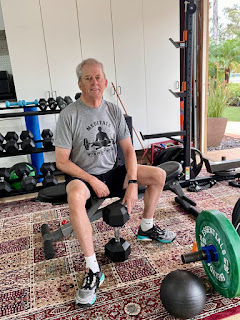One Year Sober: The Parallels Between My Fitness Journey and Giving Up Alcohol
When I retired 9 years ago, I embarked on a fitness journey with the goal of losing weight, getting stronger and getting myself healthy to be able to live to 100. Since starting this journey, I have been a member at two gyms, I have had at least 4 different personal trainers, I have done group fitness classes, zoom fitness classes and have had two different online personal fitness training programs. I have also built out a gym in my garage complete with barbells, dumbbells, resistance bands, a rowing machine and a bunch of other fitness equipment. I have invested thousands of dollars on my fitness and health over the last decade.
The toughest part of my fitness and health journey has been my personal struggle to change engrained habits that I built up over a lifetime. This has involved changing my nutrition, sleep and hydration in a way that supports my goal to build a stronger healthier body. Before starting my fitness journey, I spent decades eating junk food, hydrating with diet cokes and as a result having too much weight on my frame, having high blood pressure and sleeping poorly. None of this bothered me until I entered my 60’s and I finally realized that to age healthy I needed to change.
When I first embarked on my fitness journey, I thought I could just exercise without changing my bad nutrition and drinking habits. Gradually I learned that my on again off again commitment to exercise and my nightly glass of wine (or two) were holding me back from being truly strong and healthy as I age. Two years ago, at the age of 70, I made a commitment to begin to wean myself from my alcohol habit and to increase my commitment to strength training and nutrition. Now as I approach October 1st, 2023, I am one-year alcohol free or one-year sober (I hate the word sober it makes me feel like I was always drunk all the time), one year Diet Coke free and one year into a new strength training program with my new online trainer, Digital Barbell.
“With self-discipline most anything is possible.” – Theodore Roosevelt
I quickly learned that my commitment to a fitness journey and deciding to give up alcohol are two significant lifestyle changes that have involved a similar inner struggle. The battle between the voice that says, "It's okay to have one glass of wine" and the one that says, "It's okay to skip working out today" can be remarkably similar. Here are seven challenges we must face in both scenarios and how overcoming these hurdles can lead to a healthier, more fulfilling lifestyle and personal identity.
1. Temptation and Moderation:
In both fitness and sobriety journeys, temptation always lurks around the corner. That inner voice that whispers, "It's okay to have just one" can be relentless. When it comes to alcohol, moderation is key for those choosing to abstain. Similarly, in fitness, it's essential to balance rest days and indulgences while staying on track with your goals. Learning to distinguish between moderation and overindulgence is a crucial skill in both journeys.
2. Peer Pressure and Social Situations:
Social gatherings and peer pressure can pose significant challenges. Friends and acquaintances may encourage you to have a drink or skip a workout in favor of a night out. Resisting these pressures requires strong willpower and a firm commitment to your goals. Surrounding yourself with supportive individuals who understand and respect your choices can make a substantial difference.
3. Routine vs. Temptation:
Establishing a routine is vital in both fitness and sobriety. Skipping workouts or succumbing to a drink can disrupt the routine you've worked hard to build. The voice that says, "It's okay to skip today" can easily become a habit if left unchecked. Staying disciplined and adhering to your schedule is crucial to making consistent progress.
4. The Power of Accountability:
Accountability is a powerful tool in achieving success in either journey. Having a personal trainer or workout buddy or a sobriety sponsor can help you stay on track. They can provide encouragement when that inner voice tempts you to stray from your goals. Sharing your struggles and successes with someone who understands can make a significant difference in your journey.
5. Emotional Triggers:
Emotions play a substantial role in both fitness and sobriety. Stress, anxiety, and even happiness can trigger the urge to skip a workout or have a drink. It's essential to develop healthy coping mechanisms to deal with these emotions without resorting to old habits. Whether it's a walk in the park, meditation, or a non-alcoholic beverage, finding alternatives to address emotional triggers is vital.
6. Patience and Self-Compassion:
Both journeys require patience and self-compassion. Progress may be slow, and setbacks are normal. It's essential to remember that one slip-up doesn't define your journey. Be kind to yourself, learn from your mistakes, and keep moving forward.
7. Long-Term Goals:
Finally, in both fitness and sobriety, it's crucial to focus on your long-term goals. That one glass of wine or one missed workout might not seem significant in the moment, but over time, these choices can add up and hinder your progress. Keeping your eye on the bigger picture and reminding yourself why you started this journey in the first place can help you stay committed.
In conclusion, the challenges faced in a fitness journey and giving up alcohol share remarkable similarities. The inner voice that rationalizes indulgence or skipping workouts can be a formidable adversary. However, recognizing these parallels and developing strategies to overcome these challenges can empower you to make lasting, positive changes in your life. Both journeys require dedication, resilience, and a commitment to self-improvement, ultimately leading to a healthier, happier you.


Comments